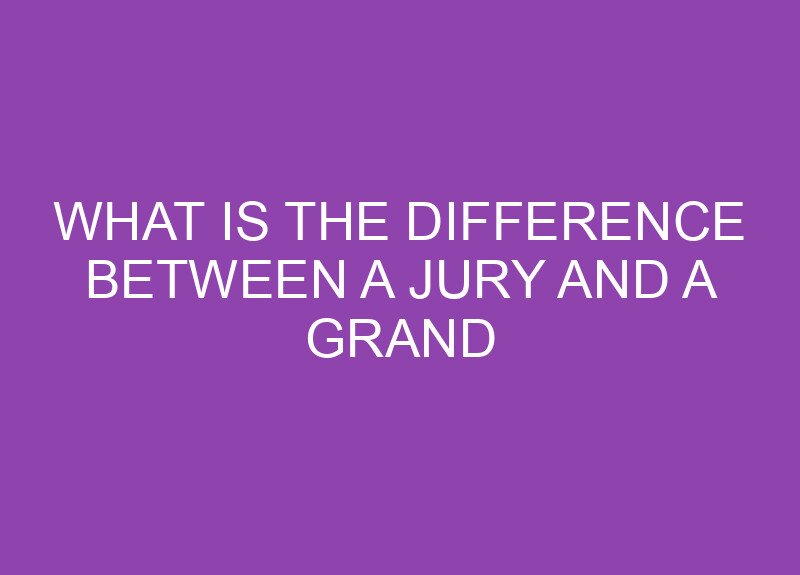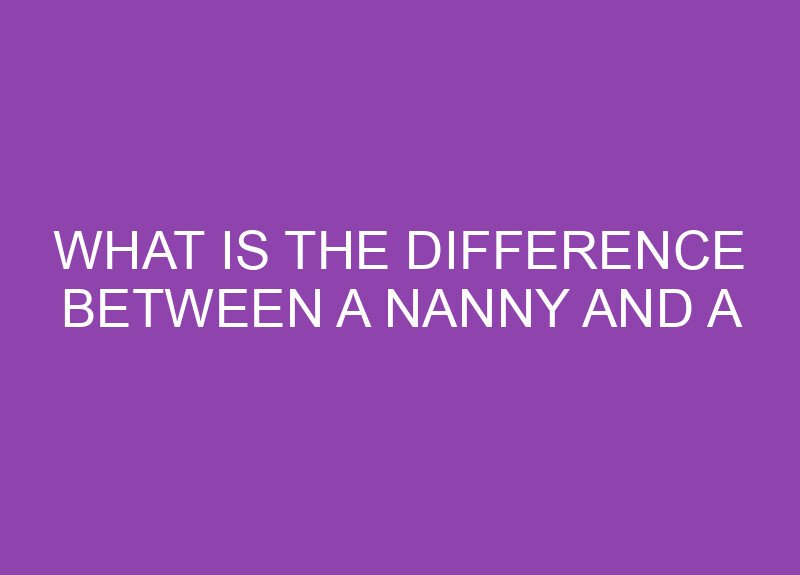Have you ever wondered about the intricacies of the legal system? One aspect that often causes confusion is the difference between a regular jury and a grand jury. While these two forms of juries share similarities, their roles and functions are quite distinct. A jury is a group of individuals who are selected to hear the evidence of a case and determine guilt or innocence, whereas a grand jury serves a different purpose altogether. A grand jury does not decide guilt or innocence, but rather assesses whether there is enough evidence for a trial to take place. The decision of a grand jury holds significant weight and can directly impact an individual’s life. To form a clear understanding of this distinction, refer to what is the main difference between a grand jury and a trial jury on Quora.
Key Takeaways:
- A jury: A regular jury, also known as a trial jury or petit jury, is responsible for determining the guilt or innocence of a defendant in a criminal trial or the liability of a defendant in a civil trial.
- A grand jury: A grand jury is a group of individuals who are impaneled to determine whether there is sufficient evidence to bring criminal charges against a person or organization. Unlike a regular jury, a grand jury does not determine guilt or innocence.
- Composition and proceedings: A jury usually consists of 6 to 12 jurors, whereas a grand jury typically consists of 16 to 23 members. Additionally, jury proceedings are open to the public, while grand jury proceedings are usually conducted in secret.
Differences between a Jury and a Grand Jury
Some legal proceedings involve the participation of either a jury or a grand jury. While both serve crucial roles in the criminal justice system, there are significant differences between the two. Understanding these distinctions is essential to comprehending the intricacies of the legal process. In this chapter, we will delve into the dissimilarities between a jury and a grand jury, helping you gain a deeper understanding of their unique functions and responsibilities.
Composition and Selection Process
The composition and selection process for a jury and a grand jury differ in several key aspects. A jury, also known as a trial jury, is typically comprised of 6 to 12 individuals, whereas a grand jury consists of a larger group, often ranging from 16 to 23 people. When it comes to the selection process, potential jurors for a regular trial are usually chosen from a pool of eligible citizens, and both the prosecution and defense have the opportunity to question and select the final jurors.
In contrast, grand jury members are selected through a different process. The selection is generally done by a judge, who may consider recommendations from various sources such as government agencies or community organizations. To maintain impartiality, the defense typically does not participate in the selection of grand jury members. This distinguishes the grand jury as an independent entity with a separate function within the criminal justice system.
Role in Criminal Justice System
When it comes to their role within the criminal justice system, a jury and a grand jury also have distinct functions. A jury is responsible for adjudicating criminal or civil cases, determining the guilt or innocence of the accused, or deciding liability in civil disputes. Their role is to listen to the evidence presented during a trial, deliberate on the facts, and make a final decision based on the law.
A grand jury, on the other hand, plays a different role in the legal process. Rather than deciding guilt or innocence, its primary function is to assess whether there is enough evidence to bring charges against a person accused of a crime. The grand jury examines the evidence presented by the prosecution and decides whether there is probable cause to indict the individual, paving the way for a trial to take place.
Decision-Making Process
The decision-making process also varies between a jury and a grand jury. In a regular jury, a verdict is reached based on the unanimous agreement of all jurors. Each juror considers the presented evidence, listens to arguments from both the prosecution and the defense, and collaborates with the other jurors to reach a consensus.
Contrarily, a grand jury operates differently. Instead of delivering a verdict, the grand jury’s decision is based on whether a majority of its members believe there is sufficient evidence to support the indictment. This means that the grand jury’s decision does not need to be unanimous, as the focus is primarily on determining whether the evidence presented is enough to proceed with a trial.
Legal Authority
Another critical distinction lies in the legal authority granted to a jury versus a grand jury. A jury possesses the power to render a final verdict and determine an individual’s fate in a trial. In criminal cases, the jury decides whether the accused is guilty beyond a reasonable doubt, while in civil cases, they determine the liability of the parties involved.
However, a grand jury does not possess such authority. Its role is limited to assessing the evidence and determining if there is enough cause to proceed with a trial. The grand jury does not determine guilt or innocence; that responsibility falls upon the trial jury.
Confidentiality and Secrecy
Confidentiality and secrecy are also noteworthy differentiators between a jury and a grand jury. The proceedings of a regular jury trial are usually public, and the jurors’ identities are known. However, the discussions that take place within the jury room remain confidential, ensuring that deliberations remain private and uninfluenced by external factors.
On the other hand, grand jury proceedings are generally closed to the public. The purpose of this secrecy is to encourage open and candid discussions among the grand jurors and the witnesses called to testify. This helps protect witnesses from potential intimidation and ensures the integrity of the investigation.
Understanding the differences between a jury and a grand jury is crucial for comprehending the legal system’s various components. By distinguishing their roles, decision-making processes, legal authorities, and levels of confidentiality, you can gain a comprehensive understanding of how these entities contribute to the overall functioning of the criminal justice system.
Similarities between a Jury and a Grand Jury
To fully understand the difference between a jury and a grand jury, it is important to first explore the similarities between these two important components of the legal system. Although they do have distinct roles and functions, there are several key similarities that you should be aware of.
Role in Upholding the Legal System
Both a jury and a grand jury play an essential role in upholding the legal system. They are an integral part of the criminal justice process and ensure that justice is served. Whether you are a member of a jury or a grand jury, you have the responsibility of evaluating evidence and making important decisions that have a significant impact on the lives of others.
Duty to Ensure Fairness and Impartiality
Another similarity between a jury and a grand jury lies in their duty to ensure fairness and impartiality. As a member of either, you are expected to approach the case with an open mind and without any preconceived notions or biases. It is critical that you set aside any personal opinions or emotions and base your decisions solely on the evidence presented in court.
Jury Instructions and Deliberations
When it comes to jury instructions and deliberations, both a jury and a grand jury follow similar processes. As a member of either, you will receive instructions from the judge on how to evaluate evidence and apply the law. During deliberations, you will have the opportunity to discuss the case with your fellow jurors and collectively reach a verdict. In both instances, the goal is to ensure a fair and just outcome.
Significance and Impact of Jury and Grand Jury Decisions
Lastly, it is crucial to understand the significance and impact that both jury and grand jury decisions can have on the outcome of a case. These decisions not only affect the defendants directly involved but also have broader implications for society and legal precedent.
Impact on Defendants
When it comes to defendants, both jury and grand jury decisions can have profound consequences. If you find yourself facing charges and your case goes to trial in front of a regular jury, the outcome of their deliberations can determine your guilt or innocence. The jury’s decision is usually reached by a unanimous or majority vote, and it heavily relies on the evidence presented during the trial.
The significance here lies in the fact that a regular jury, composed of individuals from the community, represents a cross-section of society. They bring diverse perspectives and life experiences that may shape their interpretation of the evidence and the credibility of witnesses. Their decision can have a direct impact on your freedom, as they have the power to determine whether you should be acquitted or convicted.
Impact on Society and Legal Precedent
The decisions made by both juries and grand juries are not limited to the immediate parties involved. They can have a far-reaching impact on society and influence future legal proceedings. The significance lies in the fact that these decisions create legal precedent, serving as a guide for future cases with similar circumstances.
When a regular jury reaches a verdict in a notable case, it can set a powerful example and shape public opinion. These verdicts can bring attention to pressing social issues and act as a catalyst for change. They can also establish important legal principles that shape the application of the law in subsequent cases.
Similarly, the decisions made by grand juries can have a lasting impact on society. Grand juries determine whether there is enough evidence to indict a defendant and proceed to trial. Their decisions can shape public perception of an alleged crime and influence the general trust in the criminal justice system.
Overall, the impact of jury and grand jury decisions is significant in both the lives of the defendants involved and the broader legal landscape. The outcomes can determine the guilt or innocence of the accused, set legal precedents, and shape public perception of the justice system. It is therefore essential to appreciate the gravity of these decisions, as they have the power to shape the lives of individuals and influence the course of justice for years to come.

Conclusion
Drawing together, you now have a clear understanding of the difference between a jury and a grand jury. While both serve the purpose of determining a person’s guilt or innocence, they function within different systems and have distinct roles. A jury, comprised of ordinary citizens, listens to evidence and decides the outcome of a criminal or civil trial. On the other hand, a grand jury is responsible for deciding whether enough evidence exists to charge someone with a crime. By grasping these fundamental distinctions, you are now equipped to navigate the complexities of the legal system with confidence.
FAQ
Q: What is the difference between a jury and a grand jury?
A: Understanding the distinction between a jury and a grand jury is crucial in our legal system. Here are the key differences:
Q: What is a regular jury?
A: A regular jury, also known as a petit jury, is a group of individuals selected to hear evidence and render a verdict in a civil or criminal trial. Petit juries are typically composed of 6 to 12 members, depending on the jurisdiction and the type of case. They play a critical role in ensuring a fair trial by deciding whether the defendant is guilty or liable, based on the evidence presented.
Q: What is a grand jury?
A: In contrast, a grand jury is a larger, specialized jury consisting of more members than a regular jury. Grand juries are not involved in determining guilt or liability in a trial. Instead, they are primarily responsible for determining whether there is enough evidence to bring criminal charges against an individual. Their role is to listen to the evidence presented by the prosecution and decide whether there is probable cause to believe the accused has committed a crime. This process serves as a check on the government’s power and helps protect individuals from unfounded accusations.










